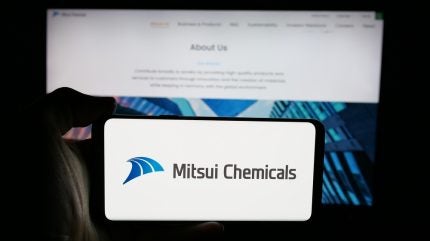
Three of Japan’s largest chemical companies are preparing to combine parts of their plastics operations in an ambitious effort to strengthen their position in a struggling global market.
Mitsui Chemicals, Idemitsu Kosan and Sumitomo Chemical have signed a memorandum of understanding that could see their businesses integrated into a single, more competitive entity.

Discover B2B Marketing That Performs
Combine business intelligence and editorial excellence to reach engaged professionals across 36 leading media platforms.
The plan centres on polyolefins, a family of versatile plastics that make up the backbone of modern manufacturing. Used in everything from packaging film and bubble wrap to car parts and water pipes, these materials account for around two-thirds of global plastic production.
Yet demand in Japan has been slipping, leaving the industry facing an uncomfortable mix of oversupply, weaker consumption and rising pressure to adapt to sustainability goals.
A changing landscape for plastics
Japan’s appetite for plastic has declined steadily in recent years, driven by demographic shifts, evolving lifestyles and environmental concerns.
With the country’s population shrinking and consumers adopting alternatives, domestic demand for polyolefins—polypropylene and polyethylene in particular—has stagnated.

US Tariffs are shifting - will you react or anticipate?
Don’t let policy changes catch you off guard. Stay proactive with real-time data and expert analysis.
By GlobalDataGlobally, plastics remain essential, but the industry is grappling with mounting challenges. Oversupply has led to thinner profit margins, while governments and businesses worldwide are pledging to cut down on single-use plastics.
This dual pressure has left even large producers searching for ways to streamline operations and secure long-term relevance.
By pooling their plastic businesses, Mitsui, Idemitsu and Sumitomo hope to manage production more efficiently and reduce unnecessary duplication.
The companies estimate annual cost savings of more than eight billion yen (around US$54 million), with further benefits expected from shared expertise in product development.
Why polyolefins matter
Polyolefins are the most widely used plastics on the planet, forming the foundation of industries as diverse as packaging, automotive, construction and consumer goods.
Polypropylene, for instance, is valued for its balance of strength and flexibility, making it ideal for containers, household items and car interiors. Linear low-density polyethylene (LLDPE) offers toughness and transparency, commonly seen in cling film and industrial wrapping.
In Japan, polyolefins account for roughly half of total plastic consumption, highlighting their importance to both manufacturers and everyday life.
Yet this very dominance has left producers vulnerable to shifts in demand. With a smaller domestic market, companies are increasingly dependent on exports and on finding innovative, eco-friendly variations to meet changing expectations.
The proposed integration would place Mitsui as majority stakeholder, with Idemitsu and Sumitomo holding smaller shares.
While details are still under discussion, the joint venture would consolidate assets under Prime Polymer, the existing partnership between Mitsui and Idemitsu, with Sumitomo’s polyolefin units joining the mix.
Looking ahead: competition and sustainability
Mergers and consolidations have shaped Japan’s plastics industry since the 1990s, yet the problem of oversupply remains stubborn. This latest move reflects the recognition that only deeper collaboration may provide a way forward.
Analysts suggest the deal could give the three companies greater resilience in a market increasingly influenced by overseas competitors, particularly producers in China and the Middle East with lower operating costs.
Beyond economics, sustainability is emerging as a decisive factor. The companies have signalled their intent to accelerate development of environmentally conscious plastics, such as recyclable and bio-based materials.
These efforts are not only about reputational value but also about aligning with regulations and customer expectations worldwide.
If approved, the integration is expected to be completed by April 2026. For the firms involved, the deal represents both a defensive measure against declining domestic demand and a proactive step toward building a stronger, greener platform for the future.
For observers, it marks another chapter in the evolving story of how the plastics industry adapts to a world that both relies on and questions its products.





